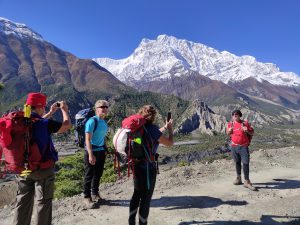
Prostitution, the act of engaging in sexual activity in exchange for money or other benefits, is a complex and controversial issue in Nepal. Despite being illegal, prostitution is prevalent in many parts of the country.
Because of the controversy, social stigma and illegal status, sex workers in Nepal face a myriad of challenges which deprive them of their basic rights. The state and society both have failed to recognise their presence in society and treat them with basic human rights.
History of sex workers in Nepal
Sex work has a long and complex history in Nepal. The history of sex workers in Nepal goes back to the Badi community, which is known as a so-called lower caste and so-called “untouchable among untouchable”.
Traditionally, most of the Badi people are involved in prostitution, even at present. Originally, the Badis are believed to have come from India during the 14th century to western Nepal. Until 1950, they used to be depended upon entertaining, dancing and singing for a living. They were supported by the wealthy upper-caste families who used to provide them with basic needs like shelter, clothing and food in return the Badis provided them entertainment. But their situation now has become worse.
People in society perceive them as untouchables, due to which they are not able to get basic jobs. When asked about prostitutes and Badi women, people in our society act very innocent and unnatural like they do not know anything. But as human trafficking still is a big problem for the country, there are several questions.
The present situation

Nepal is known for being a source, transit, and destination country for human trafficking. While the government has made efforts to combat trafficking and prostitution, the Human Trafficking and Transportation (Control) Act, 2008, has criminalised prostitution in Nepal.
Despite the laws, many women and girls are still forced into the sex trade due to poverty, lack of education, and limited employment opportunities. According to the Family Planning Association of Nepal, there are around 40,000 sex workers in Nepal. Among them, 1300 are infected with HIV, with the majority of them working in Kathmandu and other urban areas.
Sex workers in Nepal face a range of challenges that infringe upon their basic human rights. They are often subjected to physical and sexual violence from clients, pimps, and police officers. They are also at risk of contracting sexually transmitted infections due to a lack of access to healthcare services. Moreover, many sex workers face social stigma and discrimination from their families, communities and society at large.
Where some sex workers in Nepal come to the profession voluntarily, many of them end up being there trafficked, kidnapped or in many cases sold by their own relatives and parents. In the process, they face a lot of problems. Their life is full of struggles, and some people still think that they have an easy money-making profession.
Society’s view towards them
Meanwhile, society’s view towards sex workers in Nepal is also complex and often negative. Sex workers are often stigmatised and discriminated against, both within their own communities and by society at large. Most people view prostitution as immoral. In fact, sex workers are often blamed for their own victimisation.
This stigma and discrimination have a significant impact on sex workers’ lives, making it difficult for them to access healthcare, education and other basic services. Moreover, it can lead to violence and abuse, both from clients and police officers who are meant to protect them.
Sexuality is taboo in Nepal. Talking about sex is beyond social morality. As a result, people are not accepting them in society.

A report has revealed that most of the customers of sex workers globally are married and high-class people who earn well and have the capacity to spend. These men prefer sex with young girls as it reduces the chance of STDs. As a result young girl children are getting kidnapped. Most of the time, the girls are hardly 9-16 years old.
Overall, sex workers in Nepal are entitled to the same human rights as any other person, including the right to life, liberty, and security of a person. The government has an obligation to protect their rights and ensure that they are not subjected to violence, discrimination, or other forms of abuse.
The Constitution of Nepal guarantees the right to equality and non-discrimination, regardless of gender, ethnicity, religion, or other factors. However, the law criminalises prostitution, and it makes it difficult for sex workers to access basic services and protection from abuse. Many sex workers are afraid to report violence or seek medical treatment for fear of being arrested or mistreated by police officers.
Available support
International organisations such as the World Health Organization have recognised the rights of sex workers and have called for the decriminalisation of sex work worldwide. These organisations have emphasised the importance of protecting the human rights of sex workers, including their right to work safely, access healthcare services, and be free from discrimination.
In addition, there are a number of international organisations that provide support and resources to sex workers in Nepal. For example, the Asia Pacific Network of Sex Workers (APNSW) is a regional network that provides advocacy and support for sex workers in Nepal and other countries in the Asia Pacific region. The APNSW works to promote the rights of sex workers and to reduce the harms associated with sex work, such as violence, stigma, and discrimination.






















